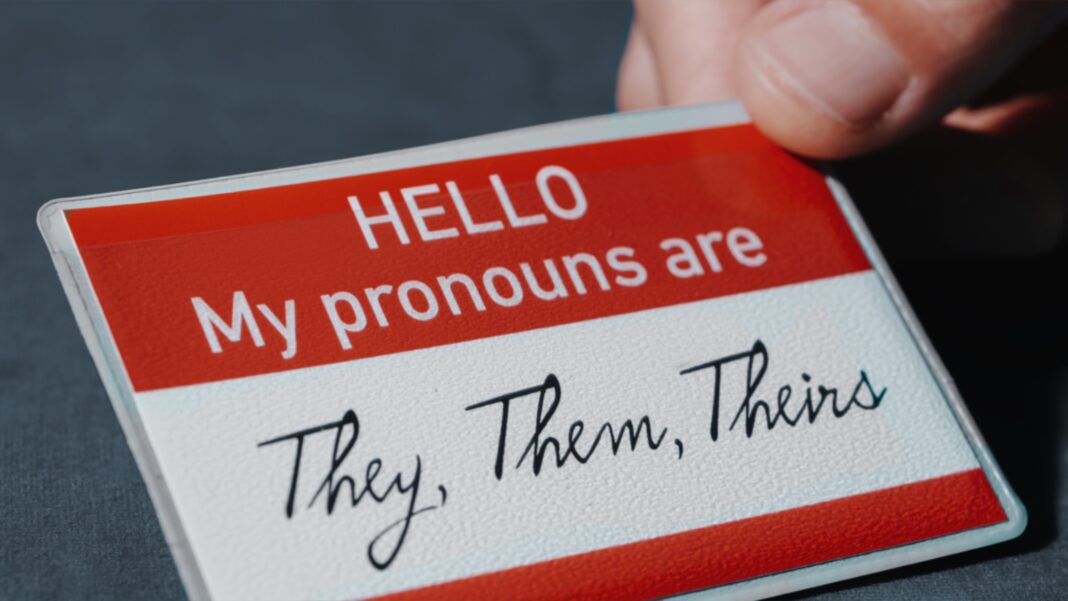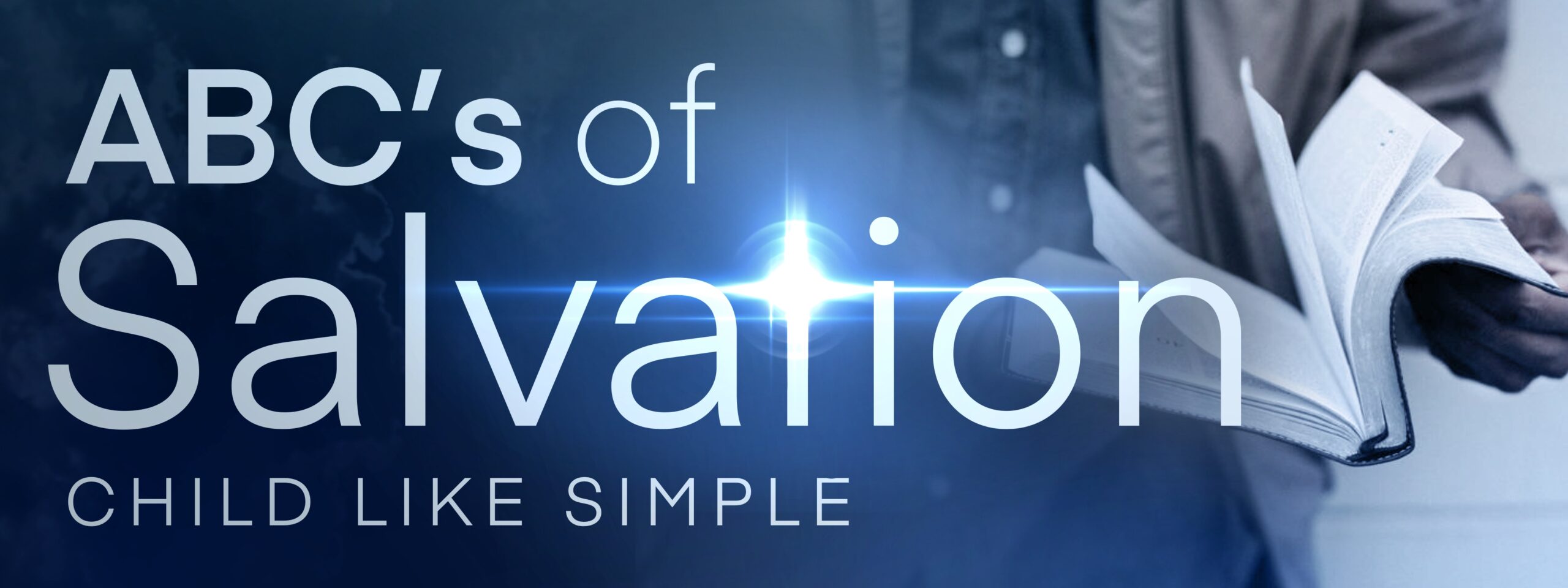I’m sure most of us never expected to hear much about pronouns after our high school English classes. However, over the last decade, pronouns have escaped from those classrooms and seem to have taken over our society, constantly being discussed on social media, news networks, and even on the floor of Congress! And though you may have thought pronouns were difficult to remember in grade school, today they are even more confusing.
Traditionally, personal pronouns refer to the sex of the person: male pronouns are he/him, female pronouns are she/her, and a group’s pronouns are they/them. Today, according to many liberals, an individual’s preferred pronouns can be whatever comes to mind, being based on a person’s “gender” rather than a person’s sex. This means an individual can change their pronouns merely if they believe their gender is different from their sex (e.g., female rather than male), which leads to the chaos we see today. “Hi, my name is _____, and my pronouns are she/him . . . or maybe it/itself, or ze/zeir, or ey/em, or clown/clownselves.” (Yes, that last one is real!)
The Problem
This pronoun revolution is part of the overarching LGBTQI+ agenda, which has been devastating to American society in many areas, including language. As I have discussed in a previous article, words have meanings, and haphazardly changing their definitions erodes those meanings. In order to have proper communication, all speakers of a language must be able to clearly understand what other speakers are saying. Such clear communication is lost when masculine or feminine personal pronouns no longer refer to biological men and women respectively.
As philosopher Daniel Moody argues, males cannot enter a female restroom because “as soon as we permit males to enter, the restroom ceases to be the female restroom. Sure, it still has the word ‘Female’ on the door, but its function has changed. Likewise, pronouns cease to be pronouns as soon as we de-sex them.” Such reckless destruction of pronoun usage dangerously provides a slippery slope, especially in the legal realm, where words must have clear and specific meanings.
As you probably know, the LGBTQI+ agenda has divided communities, families, and even churches over the last decade. The Bible clearly condemns LGBTQI+ practices, including homosexuality and transgenderism; yet many Christians are indifferent about these issues, and some even play the preferred-pronoun game, referring to transgender “women” as she/her rather than he/him, even though these individuals are biologically male.
“We’re just being kind and loving,” these Christians argue, “and allowing people to use random pronouns to describe themselves really doesn’t affect anyone, right?” That suggestion could not be further from the truth. Beyond a Christian’s spiritual and moral obligation to use a person’s sex-specific pronouns, the rise of preferred gender pronouns has led to dangerous societal and legal consequences.
Preferred Pronouns and the United States’ First Amendment
In the US, for instance, one legal issue concerning preferred pronouns involves the First Amendment’s free speech clause, which states that “Congress shall make no law… abridging the freedom of speech.” Thus, in principle, a person (say John) could legally use whatever pronouns he would like to describe himself. However, trouble arises when Ted decides to use Adam’s sex-specific pronouns rather than his (or zed’s?) preferred pronouns.
Legally in America, that should not be a problem. However, with the rise of the LGBTQI+ agenda, Ted’s actions could be considered abusive and possibly prosecutable. While using gender-specific pronouns may appear courteous and thoughtful at first glance, many members of the LGBTQI+ community desire to legislate these pronouns in order to hinder other individuals from speaking their minds. Such mind control tactics are extremely dangerous, for as religion and law correspondent Alex Grass explains in an article about gender-specific pronouns, “There is no place for commanding specific language—thoughts, even—in a free and open society. As more people surrender to the illogical demands of a totalitarian minority, our world becomes less free and more closed. Fear reigns, cowardice replaces courage.”
This is already happening in Western countries that don’t have free speech protections. For example, an Irish school teacher was suspended and legally banned from the school he was teaching at because he refused to use a student’s preferred pronouns.
While American teachers have been fired or suspended for using incorrect pronouns, many expelled teachers have been able to win lawsuits, including Nicholas Meriwether at Ohio’s Shawnee State University and Pamela Ricard at Kansas’ Riley Middle School.
These victories are significant, for as legal commentator Sarah Parshall Perry notes when describing the Meriwether case, the court’s decision was a “long overdue comfort to those who refuse to bend the knee on leftist groupthink—the kind that forces a subjective and manipulable view of one person’s self to become a defining reality for everyone else. It is a stake in the ground on behalf of religious dissenters and academic freedom.”
Unfortunately, there is a legal catch with these preferred-pronoun lawsuits. In these lawsuits, most teachers win by arguing that using preferred pronouns violates their religious convictions, which are protected by the First Amendment’s free exercise clause. (“Congress shall make no law respecting an establishment of religion, or prohibiting the free exercise thereof.”)
The free speech clause alone should protect the right to refer to someone by their sex-specific pronouns rather than their gender-specific pronouns, but the danger of using the free exercise clause to defend free speech is that a court could at some point rule that pronoun usage falls outside a person’s religious convictions, thus making “incorrect” pronoun usage prosecutable. With the pronoun debate focusing on the free exercise clause rather than the free speech clause, only freedom of religion is being protected, while the fundamental right to speak and think freely is being ignored and potentially eroded. And beyond such dangerous legal precedents, these preferred-pronoun cases are lengthy, regularly dragging on for years and potentially draining the financial and emotional resources of those defending their right to speech freely, with many expelled teachers having chosen not to sue their offending school knowing the expensive courtroom battle they would face.
Beyond the classroom, preferred gender-specific pronouns also interfere with free speech in the workplace. Traditionally and legally, American business owners have the right to establish their own rules about their private businesses as long as they do not violate federal or local law. However, with the rise of the LGBTQI+ agenda, businesses can potentially face legal repercussions by not abiding by an individual’s preferred gender-specific pronouns.
According to 2021 guidance documents provided by the US Equal Employment Opportunity Commission, “Intentionally and repeatedly using the wrong name and pronouns to refer to a transgender employee could contribute to an unlawful hostile work environment” and consequently is a violation of Title VII of the Civil Rights Act of 1964. Thus, refusing to use an individual’s preferred pronouns could constitute workplace harassment, resulting in potential legal action against both employers and employees. Though an injunction was placed against these documents in 2021, the Biden administration and the EEOC continue to announce similar workplace guidelines. Currently, 18 states are legally challenging this ruling; however, the outcome of this lawsuit is uncertain.
Fortunately, there is some hope: as the culture war surrounding preferred-pronoun usage continues to escalate, there have been some conservative victories. For example, in 2020, the Fifth US Circuit concluded in United States v. Varner that American courts cannot compel the use of preferred pronouns, though again the ruling seemed to dodge invoking the free speech clause.
More recently, the Virginia Supreme Court explicitly defended freedom of speech in its Vlaming v. West Point School Board ruling, declaring that the Virginia Constitution “seeks to protect diversity of thought, diversity of speech, diversity of religion, and diversity of opinions.” Such victories show promise for freedom of speech, and hopefully, the free speech clause will be invoked in court cases more regularly.
A Bigger Issue
Beyond the legal issues involving the freedom of speech, legal battles concerning preferred pronouns also affect parental rights. For example, in April of this year, a US district court judge blocked a 2023 Floridian law requiring school teachers to only use sex-specific pronouns, citing it violated the First Amendment. While this court case is still ongoing, it does raise concerning questions: Do teachers have the legal right to use whatever pronouns a student wants them to use without the consent or even knowledge of the parents, or do parents have a right to decide these things for their minor children?
Reality Check
Biblically, children are the responsibility of their parents, not the government or public schools. According to the Bible, parents are given authority over their children (Colossians 3:20; Ephesians 6:1–3) and are specifically instructed to correct them and guide them in righteous living (Proverbs 13:24). Traditionally, Western culture aligned with these principles, though that has certainly changed in recent years.
One of the most shocking examples of a Western government usurping parental authority happened to the Canadian Robert Hoogland in 2021. Hoogland, whose 13-year-old biological daughter believes she is a boy, refused to allow her to take testosterone injections or refer to her as he/him, instead insisting upon using her sex-specific pronouns. These decisions should have been well within his rights as a parent, but he was subsequently arrested by the Canadian government and charged with “family violence.” Though Hoogland eventually had the charges dropped in an appeals court, his arrest is shocking because his parental authority was stripped away at the whim of the government.
Such an extreme form of government intervention between a parent and child is reminiscent of Orwell’s 1984, in which the police are observed “snooping in people’s windows” and the “family [has] become in effect an extension of the Thought Police.” While we are not quite at such a totalitarian state in America, we are certainly moving in that direction, with many public school teachers regularly attempting to undermine parental authority in the classroom, including deceiving parents concerning pronoun usage.
While parental groups are fighting back against these school-instated pronoun policies, such as in Massachusetts and Ohio, all these court cases are not successful. For example, the Fourth US Circuit Court ruled in Maryland that parents could not challenge a school’s preferred-pronoun policy, though litigation will likely continue.
Furthermore, states such as California are currently attempting to pass legislation that fully protects teachers, legally allowing them to hide students’ preferred pronouns and gender identities from parents. While the outcomes of these legal battles and attempted legislation are ongoing and uncertain, the fact that we are facing such a dilemma in America is certainly disturbing.
The Solution
So how should Christians respond to these legal issues concerning preferred pronouns? Rather than just looking at the issues and their consequences, it is crucial that we understand why preferred gender pronouns have become so prominent. As America and the world continue to reject God and his Word, our society is becoming filled with those who are “lovers of self . . . lovers of pleasure rather than lovers of God” (2 Timothy 3:2–4). Without God guiding their lives, these lost individuals are seeking in vain ways to make themselves feel fulfilled and happy. God clearly instructs that we must “avoid such people” (2 Timothy 3:5). That is not to say we shouldn’t love, share the gospel with, or pray for such individuals; instead, God is instructing us to guard our own hearts and our families.
As Christians, we must follow the Bible’s authority, looking for God to guide us through his Word. When we look to the Bible, we see that God is not the author of confusion (1 Corinthians 14:33) and that he clearly created two distinct biological sexes: male and female (Genesis 1:27).
For Christians to play the game of preferred gender pronouns is to make a mockery of both God and his creation. Knowing this truth, we must not only humbly defend our beliefs, but we must also teach our children that God intentionally designed men and women differently, to be both a picture of the church and beautifully complement one another. Over and over, we see throughout Scripture the command to “train up a child in the way he should go” (Proverbs 22:6; see also Ephesians 6:4; Proverbs 13:24, 23:13–14, 29:15; Deuteronomy 11:19; Titus 2:3–6).
In my opinion, the best way we can train up our children is through a biblically influenced education. The strain of the ungodly LGBTQI+ influence on public schools (among many ungodly influences) should be a wake-up call for Christian parents. It is our duty as parents to provide our children with a Christ-focused education, such as through a private Christian school or homeschooling if possible, though that may not be an option for everyone.
At a minimum, we should be involved in defending parents’ rights and Christian freedoms in the public schools in our local area. That does not mean that we should be rude or inconsiderate; instead, we should be able to humbly and clearly explain why we disagree. Even if it is our legal right and spiritual conviction to oppose an individual’s pronouns of choice, our goal should be to defend our legal rights and convictions through proper channels with love and kindness rather than through anger and humiliation, so that others continue to have those rights.
And regardless of our children’s education system, we must be constantly on guard, protecting and guiding our children through the LGBTQI+ minefield of today’s world. As Christians, we need to remember that Satan’s goal is to seek and destroy, and the lack of communication between parents and children about these topics provides an opening for Satan to attack our families.
Not discussing and providing biblically based answers to these topics, including preferred gender-pronoun usage, leaves both children and parents vulnerable to Satan’s attacks through the liberal culture around us. As God commanded the Israelites, “These words that I command you today shall be on your heart. You shall teach them diligently to your children, and shall talk of them when you sit in your house, and when you walk by the way, and when you lie down, and when you rise” (Deuteronomy 6:6–7).
In our homes, we must regularly teach our children Scripture and disciple them in the Christian faith. Through our diligence, we can cultivate children who are confident in what they believe and will not be shaken by the world’s philosophies but will instead be shining lights for Christ.
So how do we provide our children with specific answers to preferred gender pronouns and other LGBTQI+ questions? Dr. Rosaria Butterfield has written an excellent article discussing why Christians morally should not use preferred gender pronouns. And beyond many web articles, Answers in Genesis also offers The Gender and Marriage War book and several videos, including The Transgender Agenda, Gay Marriage and God’s Word, and the Sacred series.
And before all else, we need to “honor Christ the Lord” in our hearts so that we can “make a defense” to our children (1 Peter 3:15). In order to spiritually lead our homes, we need to be regularly reading our Bibles, praying, and seeking the Lord. By continually developing and strengthening our faith, we’ll be able to live righteously and “extinguish all the flaming darts of the evil one” (Ephesians 6:16).



















